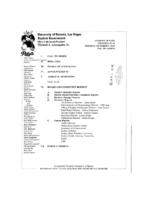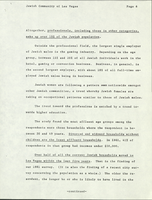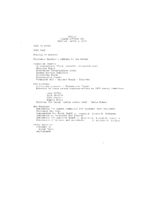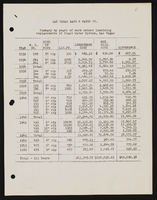Search the Special Collections and Archives Portal
Search Results
Stella Champo Iaconis Papers
Identifier
Abstract
The Stella Champo Iaconis Papers consist of a certificate for proficiency in Rapid Legible Business Writing from the Palmer Method of Business Writing given on May 11, 1927; a certificate of promotion to high school in Clark County, Nevada dated May 25, 1927; and an autograph book signed by classmates at Las Vegas High School in Las Vegas, Nevada in 1928.
Archival Collection
Archie and Zora Grant Papers
Identifier
Abstract
The Archie and Zora Grant Papers document the lives of Archie and Zora Grant from 1918 to 1973. Materials include scrapbooks, clippings, correspondence, records, certificates, and awards pertaining to Archie’s career in the Nevada Legislature, the State Board of Education, Las Vegas Housing Authority, and Las Vegas Chamber of Commerce.
Archival Collection
Stella Champo Iaconis oral history interviews
Identifier
Abstract
Oral history interview with Stella Champo Iaconis conducted by Kay Long on May 14, 1997, May 21, 1997, May 26, 1997, and September 22, 1997 for the Women's Research Institute of Nevada (WRIN) Las Vegas Women Oral History Project. Iaconis opens her interviews discussing her difficult upbringing and life on a ranch in Las Vegas, Nevada with her dad in the 1910s and 1920s. Iaconis then describes her experiences as a waitress in Las Vegas. As the interviews continue, Iaconis discusses Block 16 and sex work, the Helldorado Days, and life in 1930s Las Vegas. Iaconis ends the interview talking about her father and his career as a miner; her many husbands; and her personal history in Las Vegas.
Archival Collection

Transcript of interview with Alfred "Al" Isola by Stephen Kalish, March 15, 1976
Date
Archival Collection
Description
On March 15, 1976, Stephen Kalish interviewed Alfred “Al” Isola (born August 3rd, 1917 in Oakland, California) in his office about his garbage company and early Southern Nevada. The two discuss Las Vegas’ lack of a unified garbage system and how dumping sites have had to adjust their practices in order to limit their impact on pollution. Isola also explains the different disposal protocols for wet and dry trash. On the second tape of the interview, an unidentified woman enters the conversation.
Text

Transcript of interview with Clifford Kemple by Paul Wilkins, April 4, 1976
Date
Archival Collection
Description
On April 4, 1976, Paul Wilkins interviewed former miner Clifford Kemple (born September 28th, 1909 in Salt Lake City, Utah) in his home in Las Vegas, Nevada. The two discuss Kemple’s early life in Goodsprings, Nevada and Las Vegas, Nevada. Kemple also talks about changes that he has noticed in Las Vegas more broadly.
Text

Transcript of Interview with Merna Dennison by Ken Pyatt, March 1, 1980
Date
Archival Collection
Description
Text

Meeting minutes for Consolidated Student Senate, University of Nevada, Las Vegas, October 06, 2003
Date
Archival Collection
Description
Text

Article, The Jewish Community of Las Vegas by Jerry Countess, September 1987
Date
Archival Collection
Description
In this essay, Jerry Countess provides narrative context for a demographic study of the Jewish population in Las Vegas, and addresses the services and community needs revealed by the study and the growing Jewish population.
Text

Meeting minutes for Consolidated Student Senate, University of Nevada, Las Vegas, March 5, 1974
Date
Archival Collection
Description
Text

